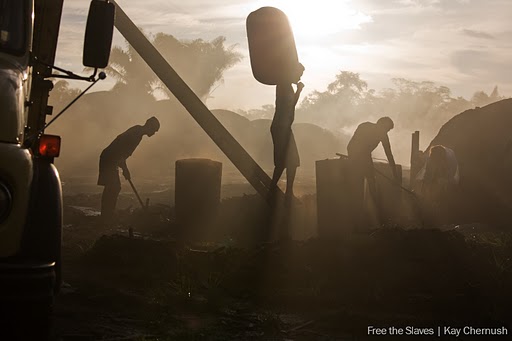Robert F. Kennedy Jr. called for the eradication of coal power at the 2010 Annual Thomas W. Ewing Lecture at Millikin University in Illinois last week. Kennedy, an environmental lawyer and son of assassinated 1968 presidential hopeful Bobby Kennedy, said that “clean” coal is a myth—and compared our economic reliance on finite energy sources to our reliance on slave labor, before abolition.
Kennedy said there are enormous hidden costs to our reliance on coal power: pollution leading to mercury poisoning, radiation, birth defects and other illnesses, and ravaged land due to environmentally destructive mining practices.
But there is one more hidden cost that Kennedy didn’t mention: Slavery. Not historic slavery. Slavery is happening right now, and it is in the supply chain of Brazilian charcoal.
See how FTS works with Brazilian advocacy groups to eradicate slavery.
With our partners in Brazil, Free the Slaves has documented camps created through illegal deforestation, where enslaved men burn wood into charcoal. This coal is used to power the manufacture of pig iron steel—a key material in auto manufacturing. A 2006 Bloomberg Markets report found that this Brazilian pig iron is used by virtually every major car company, including Toyota and General Motors. (Download the story here.)
See a Brazilian charcoal camp on the Slavery Map.
Kennedy said investment in renewable energy sources like wind power and solar energy is the “arms race of this century.” He pointed out that China, Sweden and Iceland have already begun to see the economic benefits of nurturing alternative energy industries.
Eradicating slavery, also, has immeasurable economic benefits. Free the Slaves President Kevin Bales refers to it as the “freedom dividend.” “When you let people out of slavery to work for themselves, are they motivated?” Bales said, during his recent TED talk. “They take their kids out of the workplace, they build a school, they say, ‘We’re gonna have stuff we’ve never had before’… They become consumers and producers and local economics begin to spiral up very rapidly.”

Men laboring in a charcoal camp in Brazil. Many camps use slave labor to produce charcoal, which is used to manufacture pig iron steel—a key ingredient in auto manufacturing.
